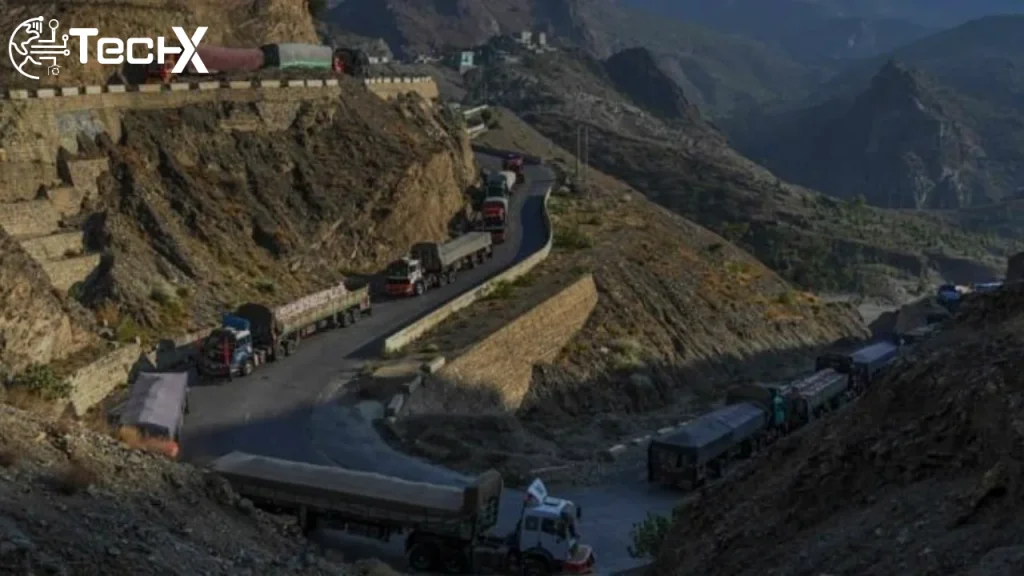Ongoing border tensions between Pakistan and Afghanistan have brought fruit and vegetable trade to a standstill. For the past two weeks, imports and exports of food items like tomatoes, garlic, and dry fruits have been completely stopped. The result has been severe inflation in Rawalpindi and Islamabad markets, where prices of daily food items have surged to their highest levels in recent memory.
Skyrocketing Costs of Everyday Produce
Tomatoes are now selling at Rs450 per kg, garlic at Rs600, and ginger at Rs800 per kg, leaving customers shocked. Peas are available for Rs400, onions for Rs180, and radish for Rs150 per kg. Kandhari pomegranates have reached Rs450 per kg, while Chaman grapes have exceeded Rs550. This sudden price jump has made it difficult for families to afford basic kitchen essentials.
Supply Shortages Deepen the Crisis
Traders say supplies from Afghanistan, including apples, tomatoes, and dry fruits have stopped completely during the peak harvest season. These goods usually help balance local demand. The halt has created a major shortage in wholesale markets, forcing sellers to raise prices sharply. Shops and stalls that once overflowed with Afghan produce now stand half-empty, reflecting the severity of the supply gap.
Chicken Prices Drop as Smuggling Stops
Interestingly, while fruits and vegetables have become costlier, chicken prices have actually dropped. The reason, market experts say, is that poultry smuggling into Afghanistan has stopped due to the border closure. With domestic supply now staying within Pakistan, chicken prices have declined. However, this minor relief is not enough to offset the overall burden of rising food costs faced by ordinary citizens.
Meat and Dairy Prices Continue to Rise
Prices of mutton, beef, and dairy products are also on the rise. Mutton now costs Rs2,500 per kg, and beef is priced at Rs1,500 per kg. Dairy vendors have announced new rates starting November milk will increase from Rs220 to Rs240 per litre, while yogurt will cost Rs260 per kg. These consistent hikes have worried households already struggling with higher vegetable prices.
Rising Food Prices Amid Pak-Afghan Border Tensions
| Item | Previous Price (Approx.) | Current Price | Change / Impact | Reason / Note |
|---|---|---|---|---|
| Tomatoes | Rs150 per kg | Rs450 per kg | Increased by 200% | Import halt from Afghanistan |
| Garlic | Rs300 per kg | Rs600 per kg | Doubled in price | Supply shortage |
| Ginger | Rs400 per kg | Rs800 per kg | Doubled in price | Import freeze, high demand |
| Peas | Rs200 per kg | Rs400 per kg | Increased by 100% | Reduced imports |
| Onions | Rs100 per kg | Rs180 per kg | Increased by 80% | Local shortage |
| Radish | Rs80 per kg | Rs150 per kg | Increased by 87% | Supply disruption |
| Kandhari Pomegranates | Rs250 per kg | Rs450 per kg | Increased by 80% | Afghan trade halted |
| Grapes (Chaman) | Rs300 per kg | Rs550 per kg | Increased by 83% | Border closure |
| Chicken | Rs700 per kg | Rs600 per kg | Decreased by ~15% | Smuggling stopped |
| Mutton | Rs2,000 per kg | Rs2,500 per kg | Increased by 25% | Market inflation |
| Beef | Rs1,200 per kg | Rs1,500 per kg | Increased by 25% | Rising demand |
| Milk | Rs220 per litre | Rs240 per litre | Increased by 9% | New vendor prices |
| Yoghurt | Rs240 per kg | Rs260 per kg | Increased by 8% | Price revision announced |
Floods Ruin Local Crops and Worsen Shortages
According to traders, recent floods have destroyed large portions of Pakistan’s local fruit and vegetable crops. Ghulam Qadir Mir, President of Anjuman Tajran Sabzi Mandi, said, “Pakistan’s crops were ruined, and we relied heavily on Afghan imports. Now supply is low, but demand is double.” He added that prices will not decrease until trade with Afghanistan resumes fully and transport routes reopen.
Containers Stuck at Closed Border Points
Sources in the district administration said several key border points including Chaman, Torkham, Khyber, and North Waziristan have remained closed for the past 14 days. Hundreds of trucks carrying perishable goods are stuck on both sides. Many containers filled with fruits and vegetables have spoiled during this period, resulting in huge financial losses for traders and further cutting the available stock in markets.
Public Faces Inflation and Uncertainty
The ongoing tension has created an atmosphere of uncertainty for both consumers and traders. Families are struggling to adjust their monthly budgets as prices rise daily. Many vendors fear that if the situation continues, shortages will deepen further in November. Until the borders reopen and trade resumes, markets across Pakistan will remain under pressure, and food inflation will continue to haunt the people.
